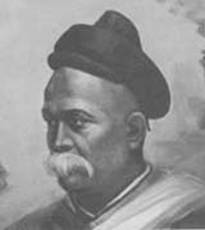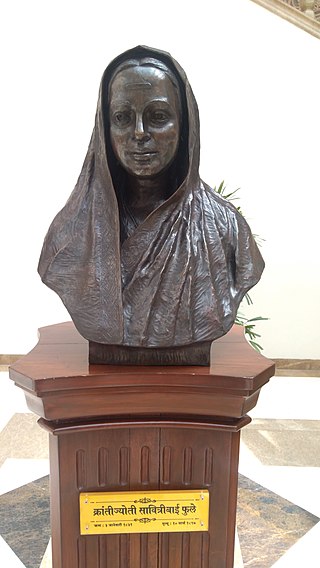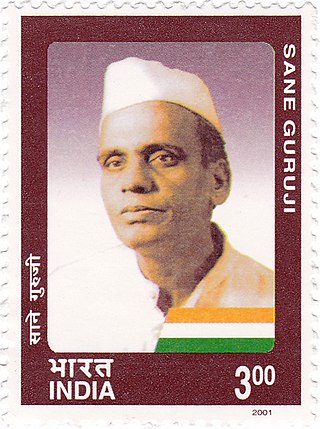
Purushottam Laxman Deshpande, popularly known by his initials or as P. L. Deshpande, was a Marathi writer and humorist from Maharashtra. He was also an accomplished film and stage actor, script writer, author, composer, musician, singer and orator. He was often referred to as "Maharashtra's beloved personality".

Vishnu Vaman Shirwadkar, popularly known by his pen name, Kusumāgraj, was a Marathi poet, playwright, novelist and short story writer, who wrote of freedom, justice and emancipation of the deprived.

Rao Bahadur Mahadev Govind Ranade, popularly referred to as Nyayamurti Ranade, was an Indian scholar, social reformer, judge and author. He was one of the founding members of the Indian National Congress party and held several designations such as Member of the Bombay Legislative Council and Member of the Finance Committee at the Centre. He was also a judge of the Bombay High Court, Maharashtra.

Irawati Karve was an Indian sociologist, anthropologist, educationist and writer from Maharashtra, India. She was one of the students of G.S. Ghurye, founder of Indian Sociology & Sociology in India. She has been claimed to be the first female Indian Sociologist.

Savitribai Phule was one of the first female teachers in India, a social reformer, and a poet. Along with her husband, Jyotiba Phule, in Maharashtra, she played a vital role in improving women's rights in India. She is considered to be the pioneer of India's feminist movement. She strived to abolish discrimination and unfair treatment of people based on caste and gender. She and her husband were pioneers of women's education in India. They started their first school for girls in 1848 in Pune at Tatyasaheb Bhide's residence or Bhidewada.

Pandurang Sadashiv Sane, also known as Sane Guruji by his students and followers, was a Marathi author, teacher, social activist and freedom fighter from Maharashtra, India. His literature was aimed at educating children. After Gandhi's assassination, he became very upset. He then died due to overdose of his sleeping pills.

Shanta Janardan Shelke was an Indian poet and writer in the Marathi language. She was also a noted journalist and academic. Her work included song compositions, stories, translations, and children's literature. She presided over many literary gatherings. Some of her compositions were noted either as stand-alone poetic works or as songs sung

Sai Paranjpye is an Indian movie director and screenwriter. She is the director of the award-winning movies Sparsh, Katha, Chasme Buddoor and Disha. She has written and directed many Marathi plays such as Jaswandi, Sakkhe Shejari, and Albel.
Anant Atmaram Kanekar (1905–1980) was a Marathi writer from Maharashtra, India.
Madhav Julian was the pen name which Madhav Tryambak Patwardhan used in writing Marathi poetry.

Satish Vasant Alekar is a Marathi playwright, actor, and theatre director. A founder member of the Theatre Academy of Pune, and most known for his plays Mahanirvan (1974), Mahapoor (1975), Atirekee (1990), Pidhijat (2003), Mickey ani Memsahib (1973), and Begum Barve (1979), all of which he also directed for the Academy. Ek Divas Mathakade (2012) and Thakishi Samvad (2024) these two recent plays were directed by Nipun Dharmadhikari and Anupam Barve respectively. Along with Mahesh Elkunchwar and Vijay Tendulkar he is considered among the most influential and progressive playwrights in modern Marathi and Indian theatre.

Gauri Deshpande was a novelist, short story writer, and poet from Maharashtra, India. She wrote in Marathi and English.
Kusumavati Deshpande (1904–1961) was a Marathi writer from Maharashtra, India.

Ramabai Ranade was an Indian social worker and one of the first women's rights activists in the early 20th century. At the age of 11, she was married to Justice Mahadev Govind Ranade, who was a distinguished Indian scholar and social reformer.

Urmila Pawar is an Indian writer and activist in the dalit and feminist movements in India and her works, all of which are written in Marathi language, have often been hailed as a critique of social discrimination and the savarna exploitation by commentators and media outlets.

Vibhawari Deshpande is an Indian actress, writer and director who works in Marathi theatre and Marathi cinema.

Jyotsna Keshav Bhole also known as Jyotsnabai Bhole, was a veteran Marathi stage artist and a Hindustani classical singer. Along with Padmabai Vartak, she was among the first female actresses to perform the role of a female character in Marathi theatre in the play Andhalyachi Shala in 1933.

Suniti Ashok Deshpande, was an Indian educator, writer, translator and interpreter, best known for her work on spreading the Russian language and culture in India.

Huzurpaga is the oldest Indian run girls' high school in India.
Shantabai Dhanaji Dani (1919–2001) was an Indian Dalit writer, politician, and social worker. She wrote primarily in the Marathi language.















